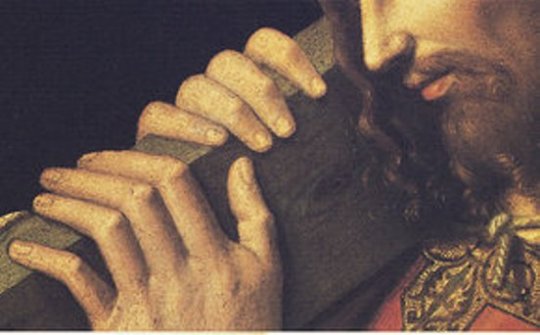#the imitation of christ
Text
“It is good for us to have trials and troubles at times, for they often remind us that we are on probation and ought not to hope in any worldly thing. It is good for us sometimes to suffer contradiction, to be misjudged by men even though we do well and mean well. These things help us to be humble and shield us from vainglory. When to all outward appearances men give us no credit, when they do not think well of us, then we are more inclined to seek God Who sees our hearts. Therefore, a man ought to root himself so firmly in God that he will not need the consolations of men.”
― Thomas à Kempis, The Imitation of Christ
#spirituality#thomas a kempis#the imitation of christ#Christianity#vainglory#suffering#humility#mysticism#initiation
45 notes
·
View notes
Quote
I am God, who enables the humble-minded to understand more of the ways of everlasting truth in a single moment than in ten years' study at university. I teach in silence, without the uproar of controversy, without ambition for honours, without clash of opinions. I teach people to despise earthly things, to find this present life irksome, to seek eternal things, to resist honours, to endure injuries, to place all trust in Me, to desire nothing but Myself and fervently to love Me above all things.
From The Imitation of Christ, by Thomas a Kempis

Sculpture: Christ as the Man of Sorrows, attributed to Heinrich Iselin (c. 1480).
#thomas a kempis#the imitation of christ#jesus#faith#christianity#humility#wisdom#against ambition#teach in silence#love of God#sculpture#man of sorrows
36 notes
·
View notes
Text
"Keep yourself as a stranger here on earth, a pilgrim whom its affairs do not concern at all. Keep your heart free and raise it up to God, for you have not here a lasting home. To Him direct your daily prayers, your sighs and tears, that your soul may merit after death to pass in happiness to the Lord." -- The Imitation of Christ
7 notes
·
View notes
Text

"Teach me, Lord to do your will. Teach me to live worthily and humbly in your sight, for you are wisdom and know me truly.
Give me the courage to resist, the patience to endure, and the faithfulness to persevere."
~Thomas À Kempis
(Image from a cover of The Imitation of Christ)
#Thomas A Kempis#The Imitation of Christ#Christian art#Lord Jesus Christ#carrying the cross#to do God's will#to have the fruits of the spirit#humility#patience#endurance#faithfulness#perseverance
10 notes
·
View notes
Text
Jesus does not content Himself with a place beside other teachers, saying, “I will give you light,” but affirms that the light is inseparable from His own person. “I am the light.” By this He means, as already observed, that it is by receiving Him as our life that we have light. But His words also mean that He imparts this light not by oral teaching, but by being what He is, and living as He does. Teaching by word and precept is well, when nothing better can be had; but it is the Word made flesh that commands the attention of all. This is a language universally intelligible. [Christ's Life,] the highest conceivable, on almost the lowest conceivable stage, and recorded in the simplest form, with indifference to all outward accompaniments attractive whether to the few or to the many, is set before us as the final and unalterable ideal of human life, amid all its continual and astonishing changes. It is by this life led here on earth He becomes our Light. It is by His faith maintained in the utmost of trial; His calmness and hopefulness amidst all that shrouds human life in darkness; His constant persuasion that God is in this world, present, loving, and working. It is by His habitual attitude towards this life, and towards the unseen, that we receive light to guide us. In His calmness we take refuge from our own dismay. In His hopefulness we refresh ourselves in every time of weariness. In His confidence our timorous anxieties are rebuked. Upon the darkest parts of our life there falls from Him some clear ray that brightens and directs. Thousands of His followers, in every age, have verified His words: “I am the light of the world: he that followeth Me shall not walk in darkness, but shall have the light of life.”
And as the Teacher taught by living so must the scholar learn by living. Christ brings light by passing through all human experiences and situations, and “he that followeth” Him, not he that reads about Him, “shall have the light of life.” There are very few men in the world who can think to much purpose on truths so abstruse and complicated as the Divinity of Christ and the Atonement and Miracles; but there is no man so dull as not to see the difference between Christ’s life and His own. Few men may be able to explain satisfactorily the relation Christ holds to God on the one hand and to us on the other; but every man who knows Christ at all even as he knows his friend or his father, is conscious that a new light falls upon sin of all kinds, upon sins of appetite and sins of temper and sins of disposition, since Christ lived. It is in this light Christ would have us walk, and if we follow as He leads on, we shall never lack the light of life. We need not be seriously disturbed about the darkness that hangs round the horizon if light falls on our own path; we need not be disturbed by our ignorance of many Divine and human things, nor by our inability to answer many questions which may be put to us, and which indeed we naturally put to ourselves, so long only as we are sure we are living so as to please and satisfy Christ. If our life runs on the lines His life marked out, we shall certainly arrive where He now is, in the happiest and highest human condition.
William R. Nicoll
#jesus christ#this is beautiful#The imitation of Christ#William R. Nicoll#this is absolutely vital#reflect on this#a humbling truth#this is why i love being catholic#Knowledge of God#follow jesus#Jesus is life#jesus is the light#christian living#This is very relevant to my life lately
9 notes
·
View notes
Text

#traditional catholicism#traditional catholic images#traditional catholic spiritual writers#traditional catholic spiritual books#the imitation of christ#thomas a kempas
12 notes
·
View notes
Text

8 notes
·
View notes
Text
“My son, says our Lord, always commit your cause to Me, and I shall dispose of it well for you, when the time comes. Await My ordinance and direction, and you will find great profit and help in them.”
— The Imitation of Christ, III-39
3 notes
·
View notes
Text
Devotional Hours Within the Bible

by J.R. Miller
The Imitation of Christ (Ephesians 4:20-30)
The Christian is to learn Christ. He is to go to school, where the pupils are Christ's followers. The textbook is Christ Himself. What a wonderful Book it is we have to study! How can we study it? We can study the life of Christ as we have it portrayed in the gospel. We can see how He lived, what kind of boy He was, how He treated His mother, how He treated His heavenly Father; what kind of man He was - His character, His disposition. His treatment of all sorts of people; how He endured personal injustice and wrong. It is a wonderful book - just the story of Christ's life. Then, we have also His teachings, which make another book.
In every Christian - there are two men. Several times Paul speaks of them. When a preacher was preaching before a king, and spoke of the struggle that goes on between the old man and the new man, the king unconsciously broke out, saying, "I know those two men!" We all know them, if we are trying to live right. The problem of Christian living is to have the new man triumph over the old man, more and more completely, until the old man is in perfect subjection to the new. Here Paul is speaking of the outer life, and urges all Christians to put away whatever in the old manner of living is not right. When we give ourselves to Christ we ought to put away firmly and forever, whatever is not in accordance with the commandments of our new Master.
The old man cannot be patched up ; there must be a new man. Nor will a new outer life do. The evil within will continually work through and soil all without. A whitewashed outer wall will never make a beautiful home while the house within is full of foulness. The only true cleansing is that which begins within and makes the heart right. Hence we are told that we must be "renewed." Not only so - but we must be renewed in the spirit of our mind; that is, at the heart of us. This is just what Jesus said to Nicodemus: "You must be born anew." The new life from above must enter into your heart. When the heart is right - the words, the conduct, the disposition, the whole character will soon be right.
"Put on the new man, created to be like God in true righteousness and holiness." The new man is the Christian man. We see at once, however, that more than reformation is required to make the new man. He is "created," and only God can create. We cannot change our own heart so that we shall have only holy feelings, desires, affections. This is the work of the Holy Spirit. We have a part in it, of course. God does not work on us as a sculptor works on the marble, hewing it into any shape he desires without any consciousness or acquiescence or will in the stone. We are not blocks of marble; we are immortal beings, and as such all work on us is wrought through our own wills, affections, desires. We are exhorted here to "put on the new man," as if it were altogether our own work. We are to listen to God's voice and seek to obey Him; then as we obey - His Spirit will work in us and produce the change which we could never of ourselves produce. We have here also the pattern after which we are to fashion our new life - "after God." God Himself is the pattern for every Christian life.
The new man will put away falsehood, and will speak truth with his neighbor. There is a story that a distinguished Englishman complained bitterly to Mr. Gladstone of some parish preacher, who in his sermon insisted upon the application of religion to a man's everyday life. This distinguished Englishman thought this was an outrageous proceeding on the clergyman's part. He thought religion should deal only with doctrine and celestial truths. But the Bible insists upon the application of religion to all our words and acts. Lying is a terribly common vice. A writer tells us that the Persians are great liars. Very likely - but they are too far away. No good can possibly come to us - from our berating the Persians. But we want to let this teaching come into our own life, and cut close as it will.
"Putting away falsehood, speak truth each one with his neighbor." How is it in our speech? Is it always true? Do we never lie? Do we never try to leave a wrong impression on another? Do we never deceive? Lying is very hateful to God, for He is absolute truth, and whatever is less than truth - His soul abhors. People talk about "little white lies." Every lie is black! A lie is a rotten stone built in the wall of life; some day it will crumble and then the foundation will sink away. Anything built on a lie - is built on the sand. We ought to train ourselves to absolute truthfulness. People are continually discussing the question whether it can ever be right to tell a lie, whether a falsehood ever can be admissible. Some people say it can, that it may be right to tell lies, for example, to save your life. What do you think about it?
But suppose it is another person's life you could save by lying; would it be right then to lie? We have an illustration in a recent trial, when a sister could not tell a lie on the witness stand, though a lie in one short word would have saved her sister's life. She said she could not do it. She would give her life's blood to save her sister - but she could not tell a lie even to save her.
"In your anger do not sin." But how can one be angry - and not sin? Is not all anger sinful? No, God is angry with the wicked. We read, too, that Jesus was sometimes angry. There is, therefore, a sinless anger - anger against sin. For example, if you see a great, strong, brutal man beating a weak, helpless woman - there must rise up in your soul a burning indignation against the act. That is sinless. But if as a result you lose your temper and fly into a passion and speak unadvisedly, you have sinned. The counsel here is that our righteous indignation against baseness, injustice, cruelty, or wrong of any kind - shall not be permitted to pass into personal bitterness, resentment, or ungoverned temper.
Here it was that Moses failed. He could not but feel a righteous indignation at the people's unbelief and rebellion - but he sinned when he made it personal, and lost his patience and spoke the angry words.
"Do not let the sun go down while you are still angry." The second counsel in this verse is very interesting. We are almost sure, sometime in the pressure of life's contacts, to grow angry. If we do, we are exhorted to get the bitterness out of our heart before the sun goes down. Several reasons for this may be suggested. Anger allowed to smoulder overnight, may break out in uncontrollable passion in the morning.
Then, at the close of every day, we ought to be ready to die, as we may never see another morning. We ought not to sleep, therefore, before getting out of our heart, everything that is not right. This word was interpreted literally in the ancient times, and the Christians who had had any differences would hasten before the setting of the sun to confess and settle their quarrels. The using of the Lord's Prayer in the evening would seem to compel forgiveness, as we must pray, "Forgive us our debts - as we forgive our debtors."
"He who has been stealing must steal no longer - but must work, doing something useful with his own hands, that he may have something to share with those in need." The new man will not steal. There are a great many ways of stealing, besides rifling a cash drawer, or picking a pocket. There have been a great many defalcations and embezzlements in recent days - but all of these were but the riper fruit of dishonesty in little ways, running on probably through years. He who steals a pin, steals - and is a thief. The boy who picks up a marble that is not his, or a penny, or takes an apple from a tree, or purloins anything - has stolen - and is a thief. He who takes off an envelope a stamp used - but not canceled, and uses it again, is a thief. He who keeps the one cent too much the grocer gives in mistake in making change - is a thief. He who, when the conductor does not take up his fare or ticket, goes out of the car and says nothing - has stolen. There is no other word for it. We must study the matter out for ourselves.
"Do not let any unwholesome talk come out of your mouths - but only what is helpful for building others up according to their needs, that it may benefit those who listen." The new man will let no corrupt speech proceed out of his mouth - but only that which is good. There is very much corrupt speech falling every day from human lips. It is a good rule for boys and men never to tell a story or to say anything in a company of their own, which they would not tell or say if their mothers and sisters were present. That was General Grant's rule, and he would not permit any officer or companion to repeat any story in his presence, which the person would not say if there were ladies present.
The kind of words a Christian may speak, is well defined here. They must be good words, that is, pure, kindly, loving, worthy; and they must be words that will edify those who hear - words that will benefit or help others, giving comfort, encouragement, incitement, instruction. Only think what havoc this rule would play with much of the talk that goes on everywhere among Christians! What edifying words did you speak last evening to your friend in that two-hours' talk you had with him? This is a large lesson.
The new man will not "grieve the Holy Spirit of God." It scarcely seems possible to us at first, that we could give pain to God. Yet the apostles warned the Ephesians against this very thing. Boys know what kind of things in their life grieve their mothers. The Holy Spirit is nearer to all of us than any mother can be, and has a more tender heart. Let us watch our words, our acts, our wishes and feelings, and all the motives of our life, lest we grieve the Holy Spirit.
Finally, the new man in Christ Jesus will "be kind and compassionate to one another, forgiving each other, just as in Christ God forgave you." If all these rules and exhortations about kindness and gentleness were followed out in our lives - how the world's happiness would be increased! How loving would our homes be! How delightful would Christian fellowship of all kinds be!
The reason urged for forgiving each other - is that God has forgiven us. Not only the reason - but also the measure of our forgiveness is indicated in this way; we are to forgive, even as God forgives us. Our Lord taught this lesson in the prayer which He gave to His disciples. Every time we ask Him to forgive us, we say, "As we forgive." But suppose we keep bitterness in our heart against someone; what is it we ask God to do, and how do we ask Him to forgive? There certainly is a wonderful field for quiet thought in these few verses which we have been studying.
#Devotional Hours Within the Bible#James Russell Miller#devotional#The Imitation of Christ#Ephesians 4:20-30#October 24#2022
9 notes
·
View notes
Text
"There I will give thee glory for the affronts which thou hast suffered; a garment of praise for thy sorrow, and for thy having been seated here in the lowest place, a royal throne for all eternity."
-The Imitation of Christ
0 notes
Text
The mind of man is often deceived in its judgement, and worldly men are deceived in their concern for material things alone. Is any man made the better for being highly
honoured by his fellows?
When one man flatters another, then one deceiver deceives another; the vain deceives the vain, the weak deceives the weak; and the higher the flattery, the deeper the shame it brings in its train.
0 notes
Text
Lenten Reflections, 15 – Imitating Christ in Carrying the Cross
Welcome to Lenten Reflection 15 on habeascorpus1.blog. This series takes as its point of departure the second-best-selling book of all time in the Christian world after the Bible – The Imitation of Christ by Thomas à Kempis (1380-1471).
As explained in Part 1 of this series, the content of these reflections is a combination of citations from The Imitation and some additional thoughts based on…

View On WordPress
0 notes
Text
Este libro es fantástico. Yo lo tengo lleno de anotaciones en la versión inglés y hoy sirve como comentario al Evangelio según san Lucas. Mis colegas de Evangelizo.org que están en Estrasburgo, Francia son los que me proveen de material para soundcloud y para Blogger en The Spiritual Journalist | El Periodista Espiritual.
Y a esta hora del día de Acción de Gracias 2022 , soundcloud está down y no hay manera de subir el audio de este texto.
Pero bueno, no importa es el texto lo que cuenta.
"Christ's glory and beauty are interiorly experienced and it is within you that He delights to be"–The Imitation of Christ, Book II, Chapter 1, P. 47, Edited by Joseph N. Tylenda, S.J., Vintage Spiritual Classics, New York, 1984.
#jesuschrist#luke#the imitation of christ#Joseph N Tylenda#the spiritual journalist#el periodista espiritual
1 note
·
View note
Text


Imitation of Christ Fall 2003
1K notes
·
View notes
Text
New interview with David about GO 2 that is entirely too homosexual for my heart to handle, but this in particular:

...Staring at Michael's what, David??
(Also his slutty-ass slinky hipped Crowley walk only came back when he was staring at Michael? Umm...)
#good omens 2#aziraphale#crowley#ineffable husbands#david tennant#soft scottish hipster gigolo#michael sheen#welsh seduction machine#jesus christ#subtext that is rapidly becoming a text#there is no heterosexual explanation for this#and here i thought david was supposed to be the subtle one#we need more interviews with him and Michael NOW damn it#i'm dying#also art imitating life#or vice versa#or both#let me live please#ineffable lovers#discourse
509 notes
·
View notes
Text
Sinners are more severe to sinners than good men are; when a man’s own conscience is lashing him, he will assume a sterner aspect towards the same, or any other sin, in another person. The holier a person grows, the more tender and the more sympathetic he is with [sinners. Like] Christ, [his] desire all along [is] to bring [the sinner] into a state of salvation. [For] as a necessary step to salvation, [Christ] desired to convince [us] all of sin, [but] to save [each man's] soul was evidently our Lord's one thought.
Rev. James Vaughan
#Rev. James Vaughan#Mercy#Sin#forgiveness#Imitate Christ#humility#holiness#Gentleness#Hope#every saint has a past and every sinner has a future#do unto others as you would have then do unto you#love your enemies
170 notes
·
View notes